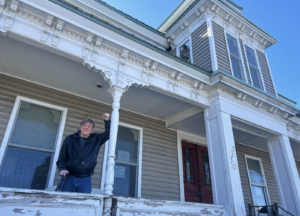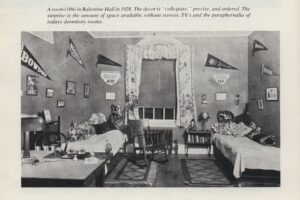Last Tuesday, Sept. 19, University of Maine students, faculty and community members filled the Minsky Hall Auditorium in eager anticipation. The famed trans scholar Dr. Z Nicolazzo gave a public talk titled “Honor Our Dead and Fight Like Hell for the Living: Trans Legacies of Resilience, Resistance, and Love.”
The talk began at 5 p.m. and was hosted by the Women’s, Gender, and Sexuality (WGS) Studies Department, with the UMaine Division of Student Life; Lesbian, Gay, Bisexual, Transgender and Queer (LGBTQ) Services; the Wilson Center and EqualityMaine serving as sponsors. Susan Gardner, the director of WGS and the Rising Tide Center, opened the public event by preaching “equity and inclusion across this campus, community, and the world.”
Also opening the event was Gia Drew, a trans advocate and program director for EqualityMaine. Drew spoke about her experiences as Maine’s first out transgender public school teacher and her accomplishments “advocating for the LGBTQ community for 33 years.”
Dr. Z Nicolazzo is an accomplished academic currently serving as a faculty associate in the Center for the Study of Women, Gender, and Sexuality at Northern Illinois University. Nicolazzo is also the proud author of “Trans* in College: Transgender Students’ Strategies for Navigating Campus Life and the Institutional Politics of Inclusion,” which was available for purchase and signing at the event.
Nicolazzo, whose pronouns are ze/hir/hirs, began by thanking the people who made the event possible but don’t typically get enough credit, like the custodians, servers and caterers of the world. Ze also held a moment of silence for the indigenous tribes because the land we stand on once belonged to them, calling out the Penobscot and Wabanaki tribes in particular. Finally, Nicolazzo encouraged the audience to tweet their thoughts about the talk using the hashtag #TransingUMaine to encourage dialogue that would continue outside of the physical space of Minsky Hall.
Nicolazzo began hir talk by referencing the many trans and LGBTQ folk in history who have advocated for the rights of other disenfranchised people to make way for future generations. Nicolazzo discussed the “various forms of historical amnesia” affecting our nation today by quoting James Baldwin’s film “I Am Not Your Negro,” saying, “The great force of history comes from the fact that we carry it with us, we are unconsciously controlled by it in many ways, and history is literally present in all that we do.”
Throughout the talk Nicolazzo highlighted different resources available as well as trans artists and activists such as CeCe McDonald and Sylvia Rivera. Hir presentation included quotes from such activists, as well as footage of Rivera’s infamous speech following the Stonewall Riots.
Tying the talk into current events, Nicolazzo mentioned current Vice President Mike Pence’s troubling history of anti-LGBTQ policies, and referred to our current president Donald Trump as “the orange mess,” warranting a hearty laugh from the audience. Nicolazzo touched upon trans bathroom bans as well, saying, “It’s not about bathrooms, it’s about erasing trans people from public life…[putting trans people] at increasing risk, threat, and vulnerability.”
Portions of Nicolazzo’s talk were devoted to appreciating history, specifically “flashpoints” like the Stonewall riots, which were featured in footage shown in Nicolazzo’s presentation. Nicolazzo explained the history behind many LGBTQ movements, and how drag queens and trans women of color were often at the forefront.
Nicolazzo commended the audience for showing their support for trans issues, admitting that this can be exhausting work, “resisting the oppression that is ever present in this world.” Ze spoke directly to audience members who have experienced marginalization, preaching, “Simply and without hesitation, you are a gem. You are a gem, and I will never stop fighting for you, because you’re worth it.” Ze noted that self-love is essential to every person’s well being, but it doesn’t always come so easily.
To conclude the talk Nicolazzo posed the question of “so what?” to the audience, explaining how we must take steps from here. Nicolazzo counseled the audience to “expand and grow their own kinship networks,” as “dependency is one of our greatest sources of power.” Nicolazzo encouraged the people in attendance to connect with love, both with each other and oneself, not because ze told them to, but in an effort to make the world a better place than we found it.









